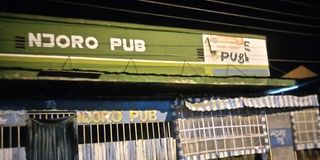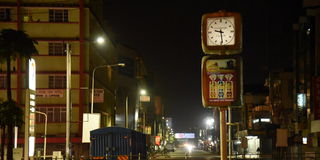Premium
Covid snuffs life out of Nakuru's K-Street

The closure of bars and ban on the sale of alcohol have left Kanu a largely ghost street by night.
What you need to know:
- With bars shut, vendors gone and just a few eateries and restaurants open, Kanu street is not just braving the loss of income but is also adjusting to a more silent, empty neighbourhood that it hasn't seen in decades.
- According to Mr Peter Maina, a trader who owns a series of lodgings in the area, business is dead.
Before Covid-19, politicians, government officials, traders, rich wheeler-dealers and the middle-class would troop to Nakuru's Kanu Street on weekends to enjoy drinks and savour mouthwatering nyama choma.
Kanu street, known for entertainment and a vibrant nightlife, was a jam-packed, active place with noisy clubs, with open businesses into the wee hours. Commercial sex work was booming -- prompting illegal brothels, sex shacks and lodgings to spring up -- earning Kanu Street its moniker as Nakuru's red-light district.

Njoro bar on Nakuru's Kanu street, which is now closed.
The street, which boasts more than 200 drinking joints and several lodgings and eateries, was a bustling neighbourhood. Some guests would come from as far as Nairobi to enjoy what Kanu Street offered. The street name is coincidentally shortened to K-Street, just like its contemporary in Nairobi – Koinange Street.
But with the Covid-19 outbreak and the restrictions imposed to contain the spread of the virus, the area's economy has dried up significantly.
The once-lively street has been reduced to a ghost town.
Last month, President Uhuru Kenyatta ordered the indefinite closure of all bars in the country, saying they had emerged as one of the weakest links in the fight against the spread of coronavirus, as revellers abused the relaxed Ministry of Health protocols.
Mr Kenyatta ordered Inspector General of Police Hillary Mutyambai to cancel licences of alcohol dealers who violate the directive. The restriction, coupled with the dusk to dawn curfew has dealt a heavy blow on the economy of Kanu street.

Kanu Street, which is usually a crowded, active street with noisy clubs and open businesses is now a deserted street at night.
A few commercial sex workers
When the Nation visited on Saturday night, only a few commercial sex workers could be seen dotting the length of the street. With the nightlife gone, the area is wrapped in an eerie silence. Traffic has disappeared and blaring music from the bars has given way to silence broken only by the low hum of electricity from nearby hotels.
According to Mr Peter Maina, a trader who owns a series of lodgings in the area, business is dead.
"Before the partial lockdown and particularly during the weekends, business was booming, but the closure of bars and other entertainment joints has heavily hurt business. I used to receive more than 50 guests on a good weekend night. All this is gone. Nowadays I am lucky if I receive 10 guests," he told the Nation.
Previously, bars, lodgings, and eateries were the most lucrative businesses on Kanu Street. But Covid-19 has hit hard the businesses -Mr Maina.
The past three months have been the worst, as businesses recorded huge losses.
Mr John Ombati, who operated a shop on the street, said the economy of the street will never be the same again.
"I was pushed out of the market by the restrictions to tame the spread of the Covid-19. I used to make at least Sh4,000 profit on a bad day, but with the closure of bars and partial opening of restaurants, I started making losses. That prompted me to close down," he said.
Not even the street vendors have been spared.

Kanu Street, which is usually a crowded, active street with noisy clubs and open businesses is now a deserted street at night.
Interestingly, commercial sex workers remain on the street. But with the pubs and other entertainment joints shut, the clients are gone too.
"The revellers who use to patronise bars, restaurants, and lodgings were the backbone of Kanu Street. Since the drinking joints were closed down, we have suffered a lot. We can't fend for our families," she lamented to the Nation.
Braving the loss of income
With bars shut, vendors gone and just a few eateries and restaurants open, Kanu street is not just braving the loss of income but is also adjusting to a more silent, empty neighbourhood that it hasn't seen in decades.
Popular hotels and lodges on the street, including Premier Lodge, Rangers Castle, Summerland Club, Alpine Hotel, Winners Pub and Njoro's Pub, among others, are counting losses due to dwindling numbers of customers.
The street is named after independence party Kanu that ruled the country for four decades before it was dislodged from power in 2002.
According to former Youth For Kanu operative Jesse Karanja, the street got its name after some party officials were settled there.





